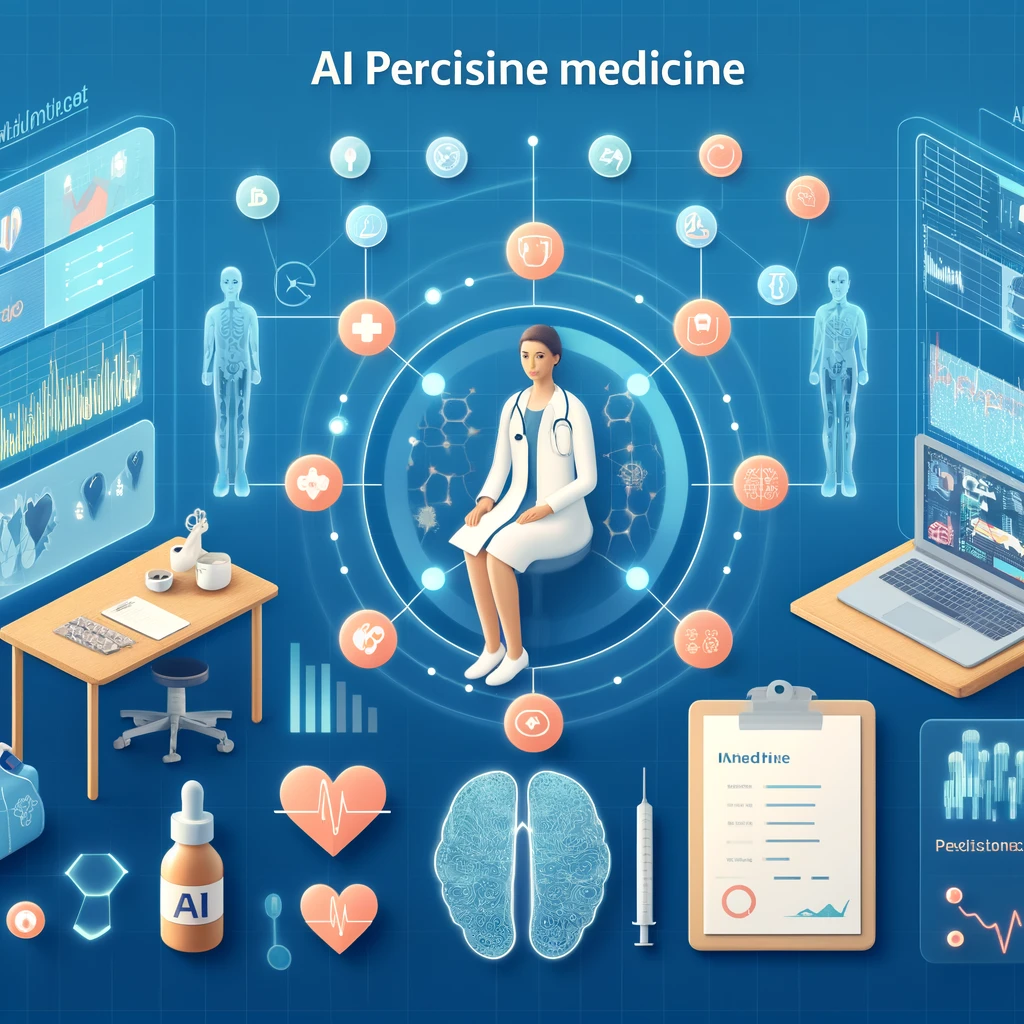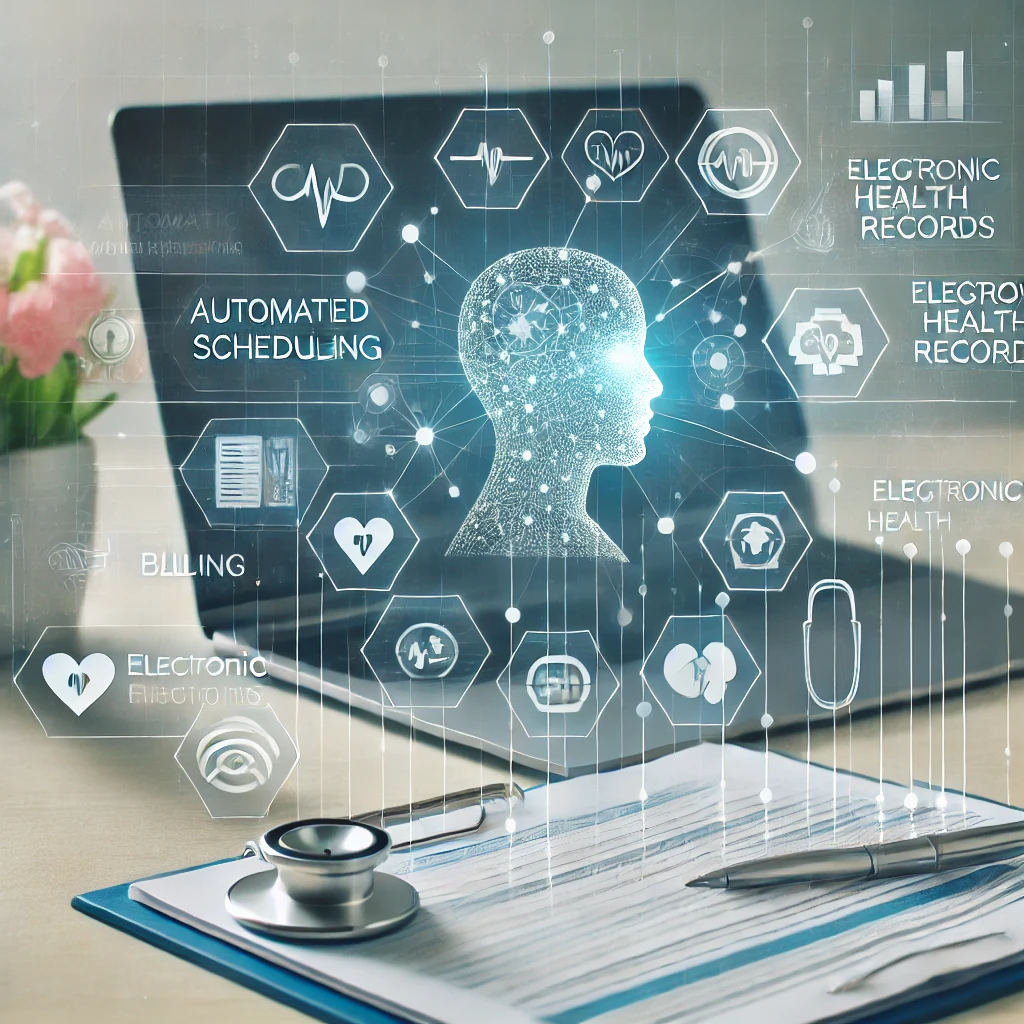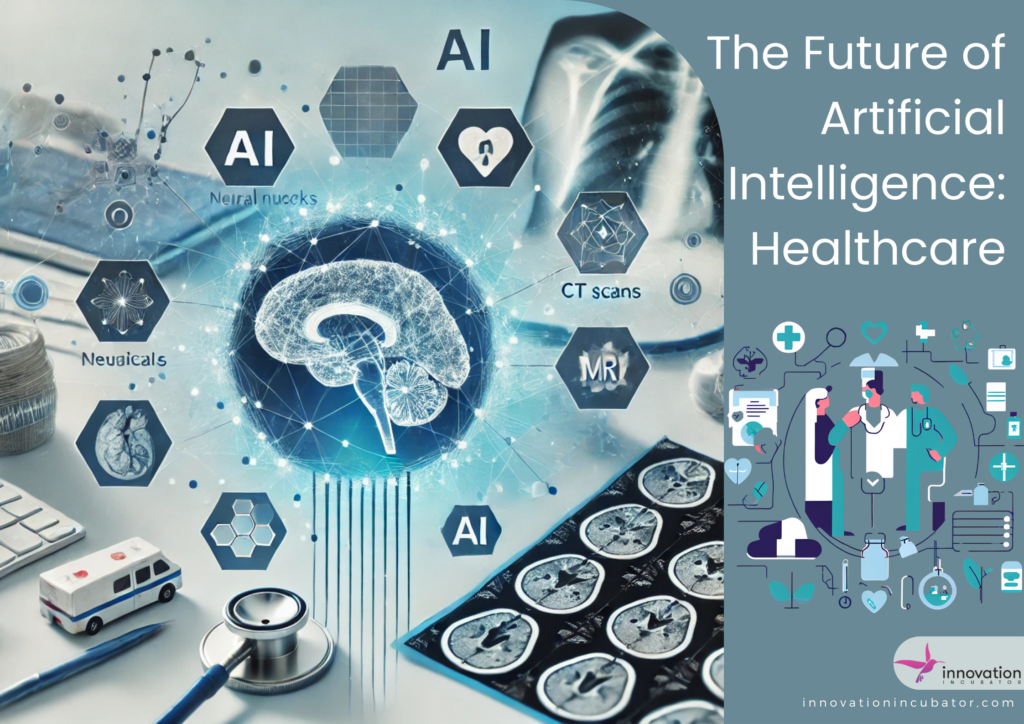The landscape of healthcare is undergoing a profound transformation, driven by unprecedented advances in artificial intelligence. As we navigate through 2024, the integration of AI in healthcare has evolved from promising potential to demonstrate reality, with the global AI healthcare market projected to reach $187.95 billion by 2030. This exponential growth reflects not just technological advancement, but a fundamental shift in how we approach patient care, clinical decision-making, and healthcare operations.
The promise of artificial intelligence in healthcare lies in its ability to analyze vast amounts of data quickly, enhance decision-making, and ultimately improve patient outcomes. AI is poised to reshape healthcare, bringing innovations that could address some of the sector’s most pressing challenges, such as staff shortages, rising costs, and the need for personalized care.
In this blog, we’ll explore the future applications of artificial intelligence in healthcare and how these advancements may benefit patients, providers, and the industry as a whole.
1. Revolutionizing Diagnostics and Early Detection
One of the most significant benefits of artificial intelligence in healthcare is its ability to improve diagnostics and early disease detection. By analyzing complex data sets, AI algorithms can detect patterns and anomalies that may be invisible to the human eye. This is especially useful in fields like radiology, pathology, and genomics, where vast amounts of data are processed to identify conditions such as cancer, cardiovascular diseases, and genetic disorders.
Consider the recent deployment of foundation models in major medical centers, where AI systems demonstrate diagnostic accuracy rates exceeding 89% across a spectrum of conditions. These systems don’t merely analyze; they learn and adapt, incorporating new research and clinical findings in real-time. At Stanford Medical Center, the implementation of ChexNet has already demonstrated superior pneumonia detection rates compared to experienced radiologists, with an AUC of 0.84 versus 0.79.
Future Applications in Diagnostics:
- Medical Imaging Analysis: AI-powered imaging tools can identify diseases in X-rays, MRIs, and CT scans with high accuracy, aiding radiologists in making quicker and more precise diagnoses.
- Predictive Analytics for Disease Prevention: AI models can analyze patient data to predict the likelihood of conditions like diabetes, heart disease, or stroke, enabling preventive measures.
- Genomics and Personalized Medicine: AI can decode genetic information faster than traditional methods, helping healthcare providers identify genetic predispositions and create tailored treatment plans.
With ongoing advancements, artificial intelligence in healthcare will enable earlier, more accurate diagnoses, potentially saving lives and reducing healthcare costs through early intervention.
2. Enhancing Treatment and Precision Medicine
AI is transforming how treatments are administered, especially in areas requiring high precision, like oncology and surgery. By leveraging AI, healthcare providers can offer more targeted and effective treatments, tailored to each patient’s unique needs. Precision medicine, which relies on data to inform treatment plans, is a natural fit for AI applications.
AI’s Role in Treatment:
- Robotic-Assisted Surgery: AI-driven robotic systems can assist surgeons in complex procedures, enhancing precision and minimizing the risk of complications.
- Personalized Treatment Plans: By analyzing patient data, including genetics, lifestyle, and medical history, AI can help clinicians design personalized treatment plans that maximize efficacy and minimize side effects.
- Drug Discovery and Development: AI accelerates drug discovery by simulating thousands of drug interactions and predicting outcomes, which can shorten the time it takes for new drugs to reach the market.
The future of artificial intelligence in healthcare holds tremendous potential for precision medicine, enabling treatments that are not only effective but also safer and more tailored to individual patients.

3. Improving Patient Care and Monitoring
The use of AI in patient care extends beyond diagnostics and treatment; it also enhances patient monitoring and ongoing care. AI-powered devices, such as wearables, can monitor a patient’s vital signs and detect abnormalities, enabling healthcare providers to offer real-time interventions.
Key Applications in Patient Care:
- Wearable Health Technology: AI-driven wearables can monitor health metrics like heart rate, oxygen levels, and blood pressure, alerting patients and providers to potential health issues before they escalate.
- Remote Patient Monitoring: AI algorithms can analyze data from remote monitoring devices, helping healthcare providers track patient progress and adjust treatments as needed.
- Virtual Health Assistants: AI-powered virtual assistants can answer patient questions, provide medication reminders, and support ongoing health management, enhancing patient engagement and satisfaction.
Leading healthcare institutions are reporting significant improvements in patient outcomes through these advanced monitoring systems. Early intervention rates have improved by 45%, while hospital readmission rates have decreased by 30% in facilities fully utilizing these AI-enabled monitoring solutions.
The Rise of Intelligent Healthcare Agents
Today’s healthcare environment demands more than basic automation – it requires intelligent systems capable of nuanced understanding and decision support. Modern AI agents, powered by large language models specifically trained on medical datasets, are revolutionizing clinical documentation and medical literature analysis. These systems achieve 92% accuracy in clinical decision support while significantly reducing the administrative burden on healthcare professionals.
4. Transforming Administrative Processes
Administrative tasks consume a significant portion of healthcare providers’ time, contributing to burnout and inefficiency. Artificial intelligence in healthcare can automate many of these tasks, freeing up time for providers to focus on patient care and enhancing operational efficiency within healthcare organizations.
AI’s Impact on Healthcare Administration:
- Automated Scheduling and Billing: AI can streamline appointment scheduling, billing, and claims processing, reducing administrative burdens and improving patient experience.
- Electronic Health Records (EHR) Management: AI can organize, interpret, and summarize EHR data, ensuring that clinicians have access to comprehensive, up-to-date patient information.
- Resource Allocation and Workflow Optimization: By analyzing patient flow data, AI can optimize resource allocation, helping hospitals manage bed occupancy, staffing, and equipment needs more efficiently.
With its ability to streamline processes, artificial intelligence in healthcare is well-suited to tackle administrative inefficiencies, making healthcare organizations more effective and lessening the load on staff.

5. Addressing Privacy and Ethical Concerns
As artificial intelligence in healthcare becomes more prevalent, so too do the questions surrounding data privacy, security, and ethics. AI relies on massive amounts of personal health data, making it crucial to protect patient information and ensure ethical practices in AI applications.
Key Privacy and Ethical Considerations:
- Data Privacy and Security: Healthcare providers must invest in secure systems to protect sensitive patient data from breaches and misuse.
- Ethical AI Use: AI algorithms should be developed and deployed transparently to avoid biases that could impact patient care, especially in diverse populations.
- Compliance with Regulations: Ensuring that AI applications comply with healthcare regulations, such as HIPAA in the U.S., is essential for protecting patient rights and maintaining public trust.
The future of artificial intelligence in healthcare will require a careful balance between innovation and responsibility, ensuring that AI benefits all patients equitably and securely.
The Road Ahead: Challenges and Opportunities
As we advance through 2024, several critical challenges demand attention. The integration of AI systems with existing workflows requires careful consideration of healthcare worker training needs and change management protocols. Organizations must balance the significant upfront investments against demonstrated improvements in operational efficiency – typically showing 25% improvement in operational metrics and 20% reduction in diagnostic errors.
Commonly Asked Questions (FAQs)
- How is AI improving diagnostic accuracy in healthcare?
AI enhances diagnostic accuracy by analyzing large datasets from medical imaging, genetics, and patient history. AI-driven models can detect patterns that may not be apparent to human clinicians, enabling early and accurate diagnoses. - Will AI replace doctors in healthcare?
AI is a tool to support, not replace, healthcare providers. It automates certain tasks and enhances decision-making but does not replicate the human expertise and empathy that doctors provide. - How is AI used in patient care?
AI is used in patient care through remote monitoring, virtual health assistants, and predictive analytics that anticipate patient needs and enable personalized interventions. - What are the risks of artificial intelligence in healthcare?
Risks include potential data privacy breaches, biased AI algorithms, and reliance on technology that may not be fully understood by all healthcare professionals. - What is the future of artificial intelligence in healthcare?
The future of AI in healthcare is promising, with applications ranging from precision medicine and diagnostics to patient care and administration. As technology continues to evolve, AI is likely to become a staple of modern healthcare.
Conclusion
The future of artificial intelligence in healthcare is bright, with numerous opportunities to improve diagnostics, treatment, patient care, and operational efficiency. AI’s transformative potential can alleviate some of healthcare’s most pressing challenges, from staff shortages and rising costs to the need for better, more personalized patient care. However, the adoption of AI also brings challenges, especially in areas of privacy and ethics, that will require careful management and oversight.
As AI technology advances, artificial intelligence in healthcare will continue to evolve, empowering healthcare providers to deliver more accurate, efficient, and personalized care to patients worldwide. Healthcare organizations that embrace AI today will be better equipped to adapt to the future, ultimately benefiting patients and society as a whole. Are you ready for this transformative leap? Then, Innovation Incubator is here to help you get powered up with AI.

